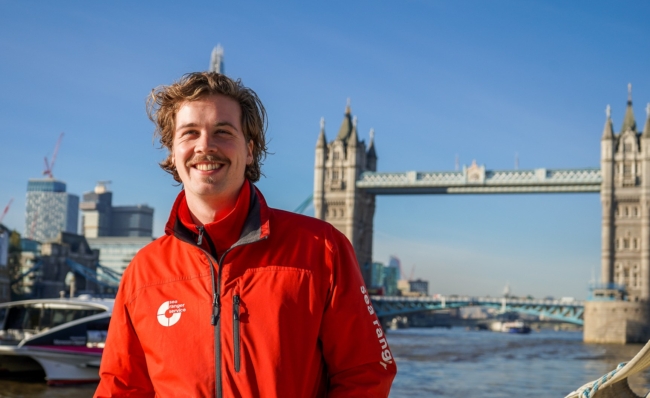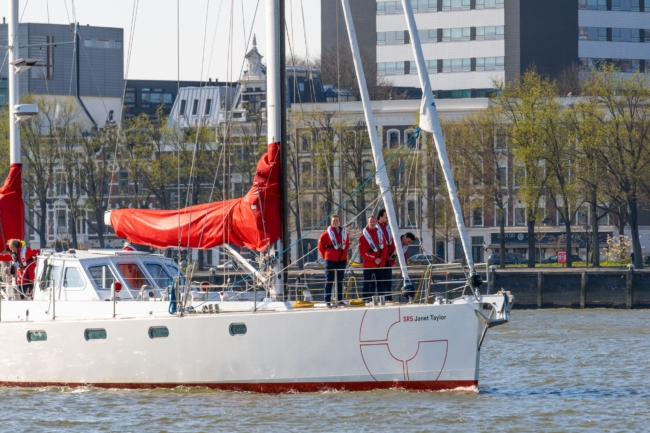Roy grows up by the sea. In the small close-knit community of Den Oever in the very north of The Netherlands, he can often be found in the local port. He talks to fishermen as a kid as is taken along on trips with the shrimp fishery. He loves it, but at the same time he doesn’t realise he could work at sea. ‘I never took the step to follow a maritime education. It just never occurred to me.’ Instead, Roy starts working in construction and moves to the nearby city of Den Helder.
After a few years his work stopped and Roy stayed at home for a while. He slipped into receiving unemployment benefits. Sitting at home for three years, one day he receives a call from someone at the municipality. ‘Have you heard of the Sea Ranger Service? I never did and looked it up on Google. A whole new world opened up for me. These people want to make society a little better. Of course I want that too, this is a real opportunity.’
New influences
Early 2022 Roy start the Sea Ranger Bootcamp, with the chance to be selected as a full-time paid Sea Ranger. ‘The whole experience really surprised me. I wasn’t used to so many different people.’ He is put in a group for assignments and immediately has to learn to work well together. ‘All those different personalities, you have to find solutions together. That was a great challenge.’ Roy reflects on those intense days. ‘Personally, I have learned that there is not just one way. Previously I could be very stubborn. But in the Sea Ranger Bootcamp there are all kinds of people who think differently. You realise there are several paths to walk. I was really positively surprised by it.’
After completing the nine-day bootcamp, Roy is waiting for the results. ‘I had been on benefits for a few years. It was now really a make or break moment. Do I stay on benefits or can I get to work? Then the call came: Do you want to come and work for us? I was so happy’. It is a decisive moment for Roy. ‘Finally being able to make something of my life and off the benefits. That was a really special moment. I was alone, but I immediately called family and friends.’ Being able to work as a Sea Ranger has a broader meaning, now that Roy has a regular income. ‘When I took something with me when I visited friends, it gave me such a sense of pride that I had earned it myself.’
Life at sea
‘When I first stepped on board the ship I thought: so many ropes! Everything has a different name.’ Roy tackles it thoroughly. He makes a detailed drawing for himself and keeps a book with all the different specifications for the sails, ropes and other equipment. ‘I had described every rope and sail and in the mornings morning I would get up early to practice. This way I was able to pick up everything quickly.’
Life at sea was enjoyable. ‘The team is like a family. Everyone gets along well and we are on a shared mission. Even if there is an irritation, it is immediately discussed. You can say, hey, I didn’t like that, and you talk about it straight away. This way it remains fun and you can continue with each other. I’m not sure it would be dealt with the same way on land.’ The sense of camaraderie and unity that Roy feels on board does him good. ‘The togetherness really does something to you. I learned a lot about working well together and about myself.’
The next step
What does he take with him as learning? ‘To be more patient and not to immediately draw a conclusion when something has happened. Look beyond how you experience it at the moment. Think about it calmly before you react. In that sense, being a Sea Ranger has really changed me.’ Roy also has a tip for people who are doubting on whether to join the Sea Ranger Bootcamp. ‘If you still have doubts about it, give it a chance. In any case, it is worth it, your efforts will be rewarded because you will be confronted with yourself and get to know yourself much better.’
After his service with the Sea Ranger Service, Roy goes on to study at the NOVA Maritime College in IJmuiden, The Netherlands. He studies as a deckhand and starts working on inland cargo ships. ‘It all happens so quickly. If I build up enough sailing time, I can be a helmsman in a year.’ The ambition does not stop there. ‘I have already gone through the first steps to become my own captain. But working towards having the qualification is one thing, ultimately becoming a captain will take some time.’






